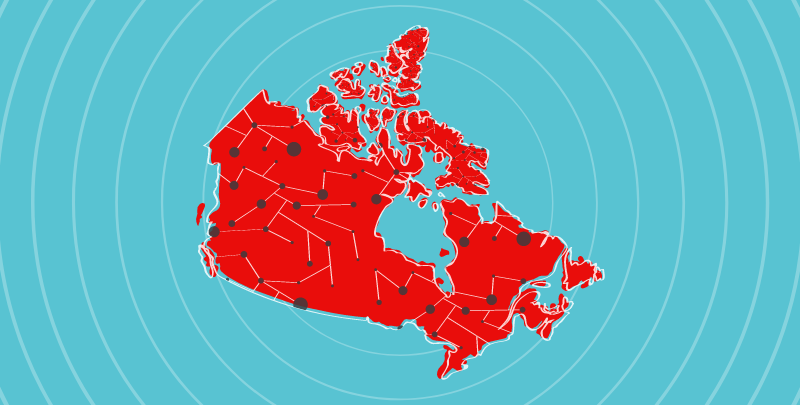NREN partners invest to extend network reach, increase capacity, and strengthen infrastructure resiliency to enable data-intensive collaboration and learning
[Ottawa, ON]
CANARIE, a vital component of Canada’s digital infrastructure supporting research, education and innovation, today announced the completion of a number of projects that extend the reach of the National Research and Education Network (NREN) to new regions and institutions, and increase the network’s capacity and reliability. These projects were funded jointly by CANARIE and its provincial and territorial partners in the NREN.
Through these projects, 10 research centres, in addition to college and university campuses that serve nearly 200,000 students and researchers, will benefit from new or enhanced connections to the NREN. These connections enable national and global access to colleagues, research instruments, services, and data. Canada’s NREN connects over 725 higher-ed institutions, hospitals, research facilities, government departments, and innovation centres to thousands of similar institutions worldwide through a global web of over 100 NRENs.
“Canada’s NREN partners work together to continually extend, evolve and deliver essential digital infrastructure to support world-class research, education and innovation for Canadians,” says Bala Kathiresan, President of BCNET and Chair of the NREN Governance Committee. “Our coast-to-coast collaborative partnership is improving efficiencies, while strengthening Canadian leadership in science and technology.”
- In Alberta, Cybera expanded the reach of the NREN to the greater Red Deer region, home to several research, innovation, and learning institutions, including Red Deer College and its Centre for Innovation in Manufacturing (CIM).
- In British Columbia, BCNET upgraded its network infrastructure in Vancouver to add 100 Gigabits per second of capacity to the NREN’s connection to Simon Fraser University, the University of British Columbia, and the University of Victoria, enabling greater collaboration among their researchers and students and with their national and global colleagues. This added capacity also enables improved collaborations with Compute Canada sites in BC and at teaching hospitals and research institutes in the region, including with TRIUMF, the Michael Smith Genome Sciences Centre, the BC Cancer Research Centre, and the Child and Family Research Institute.
- In Manitoba, MRnet increased the capacity of the Winnipeg core network to 100 Gigabits per second, directly benefiting the city’s post secondary institutions including the University of Manitoba, the University of Winnipeg, research centres, and school boards by providing reliable, ultra-high-speed connectivity to each other and through the NREN to provincial, national, and global colleagues.
- Additionally, MRnet network upgrades to Thompson and The Pas in Northern Manitoba increased the NREN’s reliability for students at connected school boards and at the University College of the North. In another project in northern Manitoba, MRnet extended the reach of the NREN by adding a new high-capacity connection to Churchill, to serve area schools and research centres including the University of Manitoba’s new multidisciplinary Churchill Marine Observatory (CMO). CMO supports research by other organizations, including Ocean Networks Canada, in addition to undertaking its own Arctic research efforts.
- In New Brunswick, ECN extended the reach of the NREN to the Huntsman Marine Science Centre and increased the local resilience of the provincial network to the benefit of institutions including the New Brunswick Community College.
- In Saskatchewan, SRNET extended the reach of the NREN to new connections at three Saskatchewan Polytechnic campuses throughout the province, including the new, innovative Manufacturing Centre at the Regina Wascana campus, enabling collaborative research and increasing students’ and researchers’ access to resources, such as Compute Canada’s high performance computing infrastructure.
For more information, please contact:
Ela Yazdani
Director, Communications
CANARIE
(613) 943-5432
[email protected]
About the National Research and Education Network
The National Research and Education Network (NREN) is an essential collective of infrastructure, tools, and people that bolsters Canadian leadership in research, education and innovation.
CANARIE and its twelve provincial and territorial partners form Canada’s NREN. We connect Canada’s researchers, educators and innovators to each other and to data, technology and colleagues around the world.
The partners in Canada’s NREN are working collaboratively to strengthen the security of this critical infrastructure. An unprecedented pan-Canadian effort is underway to coordinate network threat monitoring. This initiative involves the creation of a team of NREN Security Analysts, together with the deployment of common monitoring equipment (a Security Information Event Management platform, or SIEM) on NREN partner infrastructures. The analysts will develop incident response and mitigation strategies based on their monitoring of data collected by the SIEM. This national initiative will advance the security posture of the NREN and lays the foundation for future collaborative security projects.
About CANARIE
CANARIE strengthens Canadian leadership in science and technology by delivering digital infrastructure to support world-class research that directly benefits all Canadians.
CANARIE and its twelve provincial and territorial partners form Canada’s National Research and Education Network. This ultra-high-speed network connects Canada’s researchers, educators and innovators to each other and to global data, technology, and colleagues.
Beyond the network, CANARIE funds and promotes reusable research software tools and national research data management initiatives to accelerate discovery, provides identity management services to the academic community, and offers advanced networking and cloud resources to boost commercialization in Canada’s technology sector.
Established in 1993, CANARIE is a non-profit corporation, with the majority of its funding provided by the Government of Canada.


